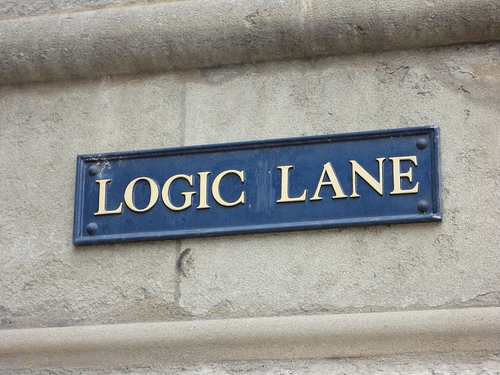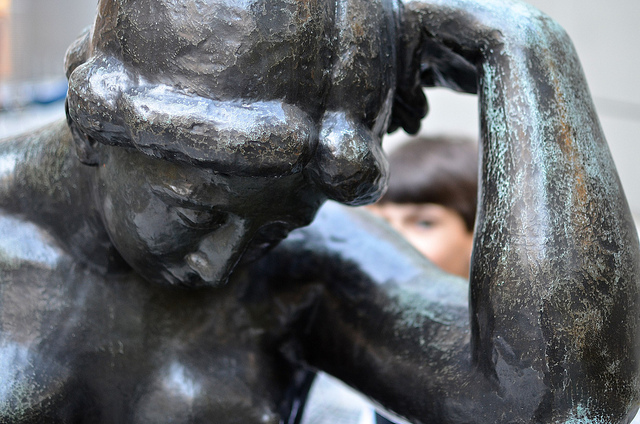This is a little essay I wrote back in 2003 after I attended the School for Criticism and Theory at Cornell University, my alma mater. Various discussions recently brought the incident back to mind. I had thought of submitting this to something like Harper’s but never did, so now I offer it to the web, still lacking in polish (more like dull, really, when I reread it, very spotty), but still relevant.
“I have had a most shameful and distressing interview with poor dear Tom Eliot, who may be called dead to us all from this day forward. He has become an Anglo-Catholic, believes in God and immortality, and goes to church. I was really shocked. A corpse would seem to me more credible than he is. I mean, there’s something obscene in a living person sitting by the fire and believing in God.”
A portion of a letter from Virginia Woolf to her sister Vanessa Bell, Saturday, 11th February 1928. [mfn]The Letters of Virginia Woolf Volume III: 1923-1928, ed. Nigel Nicholson and Joanne Trautmann, (New York: Harcourt Brace Javonovich, 1977), oo, 457-8.[/mfn]
 This summer [2003] I have had the enviable opportunity to go back to college with all the joys of learning and collegiality but without the worries of a GPA to maintain and snow through which to plod. Eleven and a half years after graduating from Cornell University I have returned to this “holy mountain” to take part as a student in the School of Criticism and Theory, an amazing institution established (in their words) “by a group of leading literary scholars in the conviction that an understanding of theory is fundamental to humanistic studies.” Over the course of six weeks we, the students, meet in bi-weekly seminars with preeminent scholars of philosophy, literature, and other humanistic disciplines in order to read and discuss works of theory and their application. In addition to these seminars prominent guest lecturers present their work, giving us a “master’s class” experience that is unforgettable. And it is a wonderful experience. I must emphasize this because I now want to present an event and an pervasive mindset exhibited during this session that might imply that I have not enjoyed or are ungrateful for my experience. That is certainly not the case, but it is unfortunate that such a positive experience has been marred in the way I am about to described. That having been stated, I am fully aware that I am most moved to reflection and composition by thoughts and ideas that most grate and irritate me. I might compare this process to the formation of a pearl, but I am certain that the piece I am producing here is hardly of any great worth. Still, it is a small chapter of a story to which I feel compelled to contribute.
This summer [2003] I have had the enviable opportunity to go back to college with all the joys of learning and collegiality but without the worries of a GPA to maintain and snow through which to plod. Eleven and a half years after graduating from Cornell University I have returned to this “holy mountain” to take part as a student in the School of Criticism and Theory, an amazing institution established (in their words) “by a group of leading literary scholars in the conviction that an understanding of theory is fundamental to humanistic studies.” Over the course of six weeks we, the students, meet in bi-weekly seminars with preeminent scholars of philosophy, literature, and other humanistic disciplines in order to read and discuss works of theory and their application. In addition to these seminars prominent guest lecturers present their work, giving us a “master’s class” experience that is unforgettable. And it is a wonderful experience. I must emphasize this because I now want to present an event and an pervasive mindset exhibited during this session that might imply that I have not enjoyed or are ungrateful for my experience. That is certainly not the case, but it is unfortunate that such a positive experience has been marred in the way I am about to described. That having been stated, I am fully aware that I am most moved to reflection and composition by thoughts and ideas that most grate and irritate me. I might compare this process to the formation of a pearl, but I am certain that the piece I am producing here is hardly of any great worth. Still, it is a small chapter of a story to which I feel compelled to contribute.
One of our initial speakers was Cornell’s own Dr. Jonathan Culler, rightly described as one of (if not the) most influential scholars of literature and a “teacher of teachers.” His topic was “Omniscience,” in reference to the narrator rather than to God. He began by remarking that in this current political climate, with a President who believes that he knows God’s will and can identify evil, he wanted to be particularly sensitive to avoid political discussions in relation to literary matters. He then said that this (presumably his reflection upon President Bush’s religious convictions) reminded him of Virginia Woolf’s letter to her sister after a visit from her friend T. S. Eliot, who had become a Christian; “There’s something obscene in a living person sitting by the fire and believing in God.” At this point the 200+ audience broke into hearty (and perhaps heart-felt) laughter.
I was surprised by my own reaction. Initially I was simply stunned. In the course of one simple quotation for the sake of humor this scholar, this man whose work I admired (and whose subsequent talk was quite good even if the conclusion was somewhat obvious), [mfn]Since I come from a theological rather than literary background I did not find it surprising in the least that Culler should find the notion of a narrator within a novel possessing powers of complete omniscience as problematic. His conclusion was that this term, “omniscience,” is at best useless and at worst misleading for describing and characterizing narrative activity. Since contemporary theologians are saying similar things about God, viz. “open theology,” it seems reasonable that such a term would be of limited use in literary criticism.[/mfn] had relegated me and anyone else in the room that believed in God to the status of a sitting corpse. When we consider, as we shall below, the full context, quoted at the beginning of this piece and certainly well known to Dr. Culler, the full force of his reminiscence is felt; those who believe in God were dead to him. I was immobile. Should I have walked out, as a sign of protest and rejection? I briefly wished that I had a bed sheet that I could use to cover myself as with a shroud. [mfn]And used so effectively by a student in “Paper Chase.” I am afraid I do not know the details of that episode.[/mfn] I remained where I was and enjoyed his lecture, but all the while I considered the quotation from Woolf. In some odd coincidence of personal intellectual history this was the third or fourth time I had read or heard a scholar use this personal comment of that author in order to marginalize and mock those who held theistic beliefs.
I of course began to consider whether such mocking behavior would have been acceptable if the group targeted for mockery had been different. What if he had said “there is something obscene about a lesbian sitting by a fire and talking about her lover.” Such a comment would have immediately been condemned. And yet targeting theists is considered legitimate, as the audience’s laughter confirmed. The next morning I brought my concerns and questions to my group. I expressed my offense (although I cautioned then as now that I am not sure that I was “offended” as much as amazed at the hypocrisy) and welcomed their comments.
The initial response was quite supportive, the scholar who led our group said that she understood my feelings. Others suggested that Culler was not trying to ostracize anyone present, but was merely creating humor at the expense of the President (ignoring, apparently, that anyone else who held views similar to the president, whether political or religious, might also be offended). Two well-meaning members of the group focused upon the quotation itself and suggested that the primary issue was that Eliot was “sitting by a fire” (more on the “fire” below). Then the comments began to be more insidious. Someone pointed out that Culler was commenting upon the current political environment in which religion and religious people have taken a stronger position. “The religious cannot feel embattled in today’s context,” said one member, “perhaps ten years ago, but not now.” “Cannot feel embattled”? What kind of language is this from leading liberal scholars of literature? Not only have I, as a person who believes in God (at this point apparently any god will do) been offended and marginalized, I have now been told that I am not allowed to feel offended since, in their view, religious people are now dominant and thus eligible for attack. I assume they will let me know when this option is again available to me.
This was the group’s general reaction. Initially they were supportive of my feelings, but slowly they came to the defense of Culler, whom one colleague described as “a great champion of that embattled religion: atheism.” They were apparently completely unaware of the hypocrisy, not just of behavior, but of the very language that they were using in order to justify their bigoted statements and views. It was “acceptable” in a certain context to attack theists. The religious, on the other hand, “cannot feel embattled.” What happened to the basic human rights and “capabilities” that Martha Nussbaum had been preaching to this group just two days earlier? What happened to all of the knowledge gained in examining how literature, film, society, and politics had systematically excluded women and minorities, queers and “our transgendered brothers and sisters”? In one short discussion they had removed from me the right to have feelings and opinions. If I was dead to Culler then I was hardly better off with this group who, in their kindness, had removed my status as a citizen of the academy or at best, suspended it until such time as…when?
Implicit (and occasionally explicit) in all of these conversations and opinions is the belief that although the world must go to great lengths to include everyone of any minority status and habit, it is under no obligation to grant similar rights to those whom they view as the dominant majority (even if this view of white, male, Christians as the dominant group is in direct contradiction with global, and even US statistics). [mfn]And I should also point out that while it is clear from numerous remarks made in the academic arena of late that it is the “Christian right” that most concern academicians, Culler’s comments were equally offensive to at least two of my Jewish colleagues present.[/mfn] It reminds me of an incident when I was an undergraduate student at Cornell. I attended a dormitory meeting led by a faculty member on the issue of racism. He asserted that because I was a white male I was a racist. This was, he insisted, a fact that I could not change or alter. I have since been told this many times in many different sensitivity training workshops for clergy and academic administrators. It seems this is the case with regards to religion. So long as I insist on believing in a god (any seems to do) I will never be allowed into the inner circle of the academy, I will always be considered suspect and fair game for jokes and mockery. In the meantime, however, I shall continue to insist and demand nothing more or less than respect since as suffrage and the civil rights movement have demonstrated in our country’s history, my reasonable (and reasoned) behavior will only serve to demonstrate the puerile nature of their own.
Addendum –
I have already made my point, I suppose, but I think something more can be gained by looking carefully at the quote from Woolf. I want to do this in part because of this curious fact that it has in some way reemerged as an academically legitimate means of expressing disdain towards the faithful. One fellow student commented that perhaps we did not fully appreciate the original context and meaning of Woolf’s original comment and that Culler was merely quoting Woolf, as if this in someway absolved Culler of all responsibility. He is correct that it demands closer scrutiny and although I am not a scholar of Virginia Woolf I am a textual scholar who specializes in exegesis and I think a brief look at the text itself will show the full, damning power of these words.
I have had a most shameful and distressing interview with poor dear Tom Eliot, who may be called dead to us all from this day forward. He has become an Anglo-Catholic, believes in God and immortality, and goes to church. I was really shocked. A corpse would seem to me more credible than he is. I mean, there’s something obscene in a living person sitting by the fire and believing in God.
What is immediately evident is that Woolf, who formerly had great respect for Eliot and who worked with him on various projects, had already come to a moral judgment concerning Eliot. Notice her use of words weighted with value: “shameful,” “distressing,” and “poor.” While the conversation was “shameful and distressing,” presumably because this man she once considered a peer was now intellectually bankrupt because of his professed faith, Tom himself is to be pitied for his condition. But she goes on to speak for her community words of excommunication. He “may be called dead to us all from this day forward.” His transgression of the intellectual creed [mfn]Woolf was not alone in holding to this creed. In 1926 two years earlier, John Middleton Murry had declared that “a writer who slips back into the bosom of the Church today is, quite simply, an insignificant writer. It is a summary test, but quite infallible.”[/mfn] has gone so far that, like the family of a Jew who converts to Christianity, Woolf calls upon her sister to sit Shiva with her as they remember the one who no longer is. Woolf then horrifically lists his core, orthodox beliefs and declares that “a corpse would seem to me more credible than he is.” She has now stripped from Eliot life and dignity. It is difficult for me to imagine a rebuke from a friend, an intellectual partner, that could have been more damning and damaging.
Finally, she declares such a thing, “a living person sitting by the fire and believing in God,” as obscene. For some inexplicable reason (other than perhaps the academic penchant to look for anything other than the obvious meaning) several of those with whom I have conversed with regarding this passage focused upon the fire. One person suggested “it was that he was sitting by the fire doing nothing with his faith.” This can hardly be the case, since Eliot did quite a lot with and because of his faith, indeed this is likely to have been the source of Woolf’s great consternation; he actually believed this stuff so much that he was acting upon his beliefs. I think that the reference to the fire is nothing more than an allusion to the real event of their conversation and her own feelings of revulsion at being in the presence of one who was so ardent about beliefs that she herself found so repugnant.
What I am most interested in is the use of this quote by contemporary scholars. It seems that it offers them the ideal weapon for use in attacking the only group left vulnerable. It is an historical reference, so if pushed to the wall one could always reply that she was merely speaking from her own time and context (aren’t we all?). It is witty. There is no doubt that there is humor in her hyperbolic imagery. And it allows the one who is quoting Woolf to appear enlightened and intelligent, after all they are quoting Virginia Woolf. Yet none of that removes the explicit condescension and offense of her comment when presented to a larger community. Perhaps, only perhaps, it is acceptable in a private communication between family members about a close friend. Any modern scholar who wishes to identify themselves with her sentiments should, however, be prepared to have similar derisive comments directed at themselves (although I do not condone such behavior) since they are, after all, declaring through their own actions that respect and dignity are no longer necessary elements of academic discourse.
That is not, however the attitude or response that I believe Eliot would have had nor should it be the response that those of us in religious communities. Perhaps there is still something to be learned from those who sit by the fire believing in God. Such as loving your neighbor and treating them as you would like to be treated yourself.





6 thoughts on “Who’s afraid now? Academic intellectualism and the rejection of God.”
I’m going to say it up front: I am an agnostic (former Christian) and an academic. So I sympathize with the quote on one level. But I totally agree with you that there is something really wrong with what happened at the event you described.
Culler’s citation is hard to analyze (in terms of his motives) but he should have realized that such an extreme reaction to theism would be offensive to some. (Of course, most of our statements about important matters could easily prove offensive to some.) Even if it wasn’t malicious, it was insensitive. One can’t be held entirely captive to the “lest I offend someone” thing, but some statements are better left unsaid in public discourse. Culler should have known better.
What really gets me in your essay, however, is the reaction in the small group. That kind of crap is ridiculous. It merely perpetuates the stereotype that academics are a bunch of smug, godless twits. My father calls them “pin-heads.”
Just to work the other side now: Looking at her statement, I can say that I understand where Woolf’s comment is coming from. I am surprised, because of my own journey from Christian faith, that some biblical scholars can remain faithful. It seems hard to believe that some manage to salvage or even strengthen their faith despite the intense historical research and critical evaluation their profession requires. But it happens all the time. I have no time for simplistic fundamentalism; it’s anti-intellectual. And I’ve contributed more than my fair share of giving someone a hard time on their blog because they let their faith / dogma frame certain biblically-related issues rather than allowing the historical and comparative research inform their dogma (over at ancienthebrewpoety, e.g.). OK, I’ve even asked some loaded questions and made some pointed statements about faith and biblical scholarship. But even in all of this there must remain some modicum of mutual respect and civility between intelligent people. If we grant such respect to our students (hopefully!), how much more so should we to our peers! (How’s that for working in a Qal-wa-Homer?)
There’s something to be said for the old “scholar and a gentleman” characterization. We would all do well to remember that civility is a hallmark of civilization.
Nice piece.
On a related topic, you might find my wife’s post on being an atheist while working at a Christian bookstore interesting.
Given that this is a story about Cornell, I would point out that Cornell was founded by Andrew Dickson White who wrote the book “A History of the Warfare of Science with Theology in Christendom” around 1896 or so. He was not a scientist, but rather a historian and the warfare was something dreamed up by earlier scholars, while it was something that apparently weighed heavily on his psyche. Washington Irving earlier falsely wrote that Columbus was opposed by flat earth Christian theologians, and White gave credibility to this nonsense and made sure that in the textbooks I read as a child in public school in Tennessee. Virginia Wolfe was probably just born as a child of this culture. Drew has a related post referring to the 1920’s and the changes that occurred as fundamentalists reacted against modernism. What modernist did to society, beginning in the late 1700’s along with their methods is rarely discussed.
Alan, thank you very much for your comments. I would just add that Culler knew full well the reaction he would get and has been saying such things for the reaction for decades. That was part of my ire, knowing that he may well have been doing it to try and call out the theists in the audience, to see if he could get our dander up.
At some point I think I will have to address how I “manage to salvage or even strengthen their faith despite the intense historical research and critical evaluation [my] profession requires.”
I look forward to reading our wife’s post as well.
Looney, it is precisely this nature of the founding of Cornell (the only Ivy that never had a seminary or divinity school and did not have religious studies until 1992, I was the first to graduate with a minor and helped to establish the program) that has bred a particular ethos of aggression towards religion.